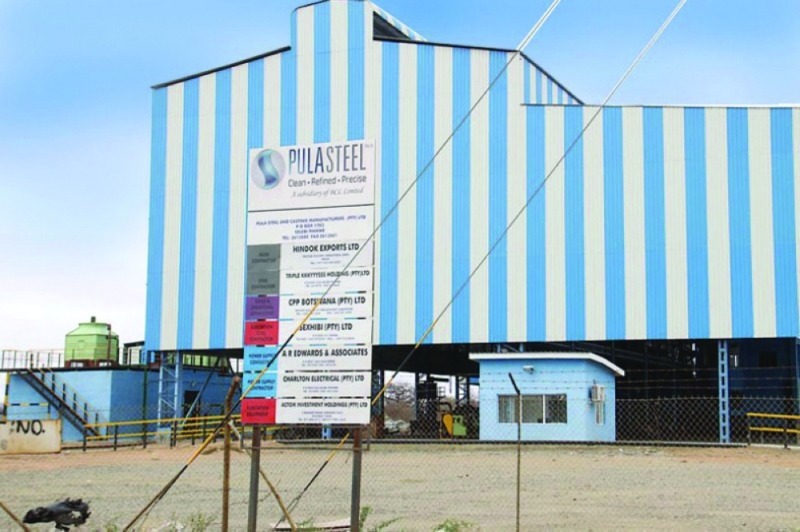High Court reverses Pula Steel P18m sale
Mbongeni Mguni | Tuesday October 15, 2024 11:34


In a recent ruling, Justice Zein Kebonang of the Gaborone High Court upheld arguments that the deal had improperly favoured the winning bidder, Sherashiya Pty Ltd. The case was brought against the liquidator, John Hinchliffe and Sherashiya by VRI Metals, a subsidiary of Vision Ridge, which also owns the Ikongwe iron ore mine near Shoshong.
VRI won a previous bidding round in 2022 for Pula Steel, but failed to settle the P16 million price tag, leading to another bidding process in 2023 won by Sherashiya. Both VRI and Sherashiya are Indian origin firms that specialise in steel manufacturing.
“The first respondent’s (Hinchliffe) decision to sell the immovable and movable assets of Pula Steel and Casting Manufacturers to the fourth respondent (Sherashiya) following a tender offer, is reviewed and set aside,” Kebonang ruled.
He also ordered the liquidator to restart Pula Steel’s sale. The liquidator and Sherashiya have also been ordered to pay VRI the costs of the suit.
VRI dragged the liquidator and Sherashiya to court alleging that the process taken last year in which Sherashiya won the bid to take over Pula Steel was flawed.
In his judgment delivered earlier this month, Kebonang found that the liquidator had essentially finalised a deal with Sherashiya for Pula Steel’s sale, but kept VRI and other bidders in the dark and on standby in case the preferred deal failed.
“He (the liquidator) was set on accepting Sherashiya’s bid and strung everybody along. “In his own letter to the Master dated March 22, 2023, he (the liquidator) indicated that he had accepted Sherashiya’s offer and made assurances to it and that other bidders were being in the process purely as a safeguard measure in the event Sherashiya failed to come up with the required funding,” Kebonang said.
VRI claimed that after it won the 2022 bidding, it had spent P6 million “resuscitating the plant, hiring staff, settling rates and maintaining the plant generally”. However, the agreement was terminated on March 14, 2023 after VRI failed to abide by a requirement to settle the P16 million sale price. At that point, VRI needed to pay P12.8 million to finalise the deal.
According to Kebonang’s findings, the liquidator then invited new bids for Pula Steel on March 16, sending VRI an invitation to try again as well. The original closing date for bids was March 20, but the liquidator extended this to April 20. The letters advising on the extension were sent to all bidders except Sherashiya, Kebonang stated.
“Documents filed of record, in particular the first respondent’s (the liquidator) bank account, indicate that Sherashiya made payments of P1.5 million on April 4, 2023, P750,000 on April 5, P2.75 million on April 14, P3 million on April 18 and P8.5 million on April 2023,” the judge said.
The latest developments come as Sherashiya had announced its plans to invest in Pula Steel’s revival. In a previous interview, Sherashiya’s local managing director, Gopal Hebbar, told Mmegi that the company was steaming ahead with its plans.
“Our target is the domestic market, with any surplus going for export.” “Our target is to push towards full capacity of the plant, but that will depend on our ability to source raw material. “We do hope to expand production, but that also depends on the raw material of which we don’t see too much of it,” he said in an interview last August.
Pula Steel closed in 2017 – just two years after it was built at a cost of P130 million – strained by financial and technical challenges, particularly the shortage of its raw material, scrap metal. Prior to its liquidation, Pula Steel was fed with scrap metal from BCL Mine and was part of the mine’s life extension plans, known as Polaris II.
BCL Mine injected a total of P111.2 million into Pula Steel before shutting down in October 2016.
At the time of its liquidation, creditors were reportedly owed about P100 million, meaning under a sale at P18 million, creditors would get back thebes for pula.
The liquidation process has been beset by challenges including lawsuits from the plant’s founders.
In 2020, a sale to South African buyers was cancelled after the bidder, DH Machine Manufacturing, was discovered to have been linked to Coinit Trading, a suspected pyramid scheme raided by the South African Hawks and financial investigators.
